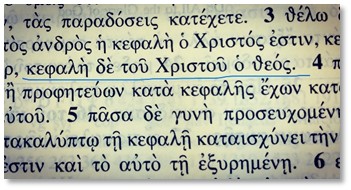 Last week I bought N. T. Wright’s magisterial 2-volume work on Paul, Paul and the Faithfulness of God. It’s over 1,500 pages. Needless to say, I haven’t finished it yet. But apparently Doug Moo has, and he has a very helpful review posted at The Gospel Coalition website. In light of previous controversies, one particular passage in Moo’s review caught my attention. And you probably won’t be surprised that it has to do with justification. Here’s the excerpt:
Last week I bought N. T. Wright’s magisterial 2-volume work on Paul, Paul and the Faithfulness of God. It’s over 1,500 pages. Needless to say, I haven’t finished it yet. But apparently Doug Moo has, and he has a very helpful review posted at The Gospel Coalition website. In light of previous controversies, one particular passage in Moo’s review caught my attention. And you probably won’t be surprised that it has to do with justification. Here’s the excerpt:
[Wright] also continues to stress a future justification that will be “according to the fullness of the life that has been led”… or “on the basis of the totality of the life led” (1028). I sympathize with Wright’s desire to accommodate the emphasis Paul puts on obedience, and I think he’s right to find a future aspect of justification in Paul. But little words are very important here; I agree future justification is “according to” the life lived but not “on the basis” of the life lived.
It’s very interesting that—after all the controversy of recent years—Wright still chooses to talk about future justification “on the basis of” a person’s obedient life. This language has appeared elsewhere in Wright’s work, and it was the basis of his very public back-and-forth with John Piper (recall Piper’s book-length critique and Wright’s response). Wright and I had a brief back-and-forth about the matter here and here. I’ll be interested to see how this plays out in the wider argument of the book. Does Wright clarify in a way so as to assuage his recent critics? I don’t see how he can with language like “on the basis of the totality of the life led.”




9 Comments
Scott Lencke
Denny –
I think, as one will note in the links you provide to your 2 previous articles in which Tom also weighs in with some comments, Wright has done well to point out more than anything that people are “getting their knickers in a twist” (a good British expression) over two phrases that actually could be, and probably are, communicating the exact same thing. Those 2 phrases are: “according to” and “on the basis of”. He has spent much time clarifying what he means and how these 2 phrases are simply a way to talk about the issue in Paul of future justification.
Not to mention that, in creating our systematic theologies (which aren’t terribly bad, but can cause problems when dealing with actual wording of Scripture passages), we forget about faithfully dealing with the detailed wording of passages like Gal 5:5-6 or even Jesus’ words in the parable of the sheep & goats in Matt 25: Come to the kingdom prepared for you – why? – For I was hungry and you gave me food, I was thirsty and you gave me drink, I was a stranger and you welcomed me.
I think Wright does well to show how present & future justification connect strongly. Who inherits the kingdom – the community of people who lived in accordance with the kingdom, all because their lives were transformed after seeing the kingdom in new birth.
Blessings
Mike Bird
Denny, I’ve made it public that NTW’s use of the phrase “basis of a life lived” does make my teeth grate, but that’s because us Reformed guys are hyper-sensitive to the issue and demand greater precision in the language. It is interesting though that on p. 1028, which Moo quotes from, NTW sets this phrase in the context of saying, “We note again, for the avoidance of doubt, that Paul sees all these . . . points as utterly dependent on the basic gospel events of the Messiah’s death and resurrection, the events in which Israel’s God dealt with sin and launched his new creation.” Clearly he does not mean “basis” in the sense of some kind of merit theology.
Denny Burk
That’s what he seemed to clarify in the ETS discussion with Schreiner. That’s why I don’t understand why he keeps using the confusing language.
Andrew Cowan
Hey Dr. Burk. Did you read the JETS version of his ETS talk? He briefly discusses the issue of the word “basis” and why the full explanation of what he has always meant by “basis” is not what Reformed critics hear in this formula (JETS 54.1, pp. 60-61). It seems that his post-conference reflections led him not to be worried about precise distinctions between “in accordance with” and “basis.”
Denny Burk
Even in the JETS article, he’s still not very clear. Moreover he accuses critics of arguing about words. But I don’t think he’s fully appreciated his critics if he thinks this is merely a dispute about words. Even in the article, he makes it sound like final justification is based on one’s life of obedience–yes, a Spirit-wrought life of obedience–but nonetheless one’s own inherent obedience. That’s the issue, and he still falls short of clarity on that fundamental point.
Scott Christensen
You can be sure that if scholars of NTW’s caliber lack clarity, then when their teaching filters down to pastors preaching, they will lack clarity and then we will have a very confused laity.
Daniel Chen
I think we need to get past these two words. Reformed people don’t even appear to use them consistently. See Rick Phillp’s link below.
To move forward, reformed people need to ask more precise questions to make sure Wright isn’t holding a concept of merit theology. Questions like:
How does God reward eternal life to Christians based on their pattern of life? Is the judgment more like when someone gets a promotion or get a grade on a test or when a child attempts to clean a room but fails miserable but still gets a reward bc he is father’s son or the father cleans the room for him. Probably not the best questions…but i am sure smarter people than I get the point and could come up with better ones.
http://www.reformation21.org/articles/five-arguments-against-future-justification-according-to-works.php
Pingback:
John McKendricks
John McKendricks, in the beginning there was no real public back and forth between Wright and Piper. Piper did not show up for the actual public debate on Justification deferring to another candidate a few years back. When N.T. Wright was made aware of the argument by John Piper with him a bit later. As N.T. noted in an interview with about Piper that it seems a bad idea to ignore the context of firs-century judaism in better understanding Paul.